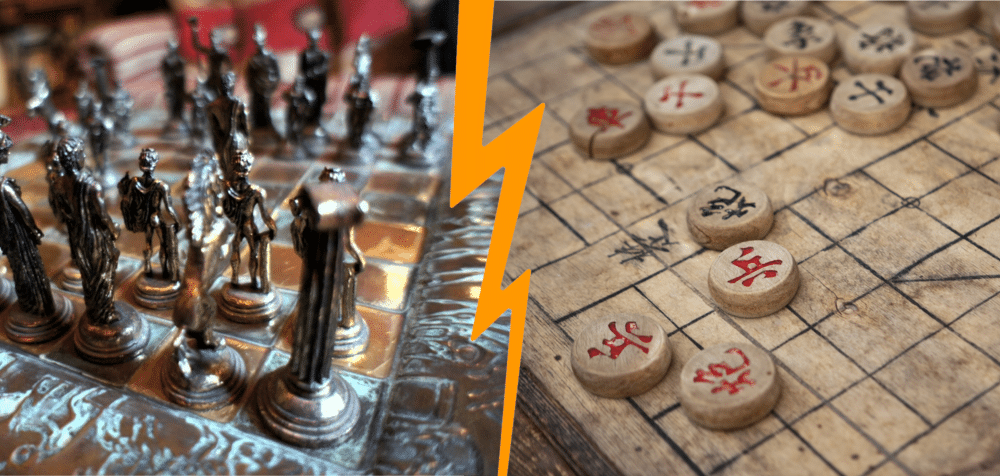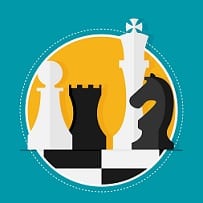
Historical records show that ancient peoples developed and played games, and some of them are still played in current times.
In the Western world, chess seems to be famous not only for being a game of intelligence and strategy but also for having been around for quite a considerable time. On the other half of the planet, the same is said about Xiangqi, also known as Chinese Chess (or Elephant Chess).
But these are not the only similarities between the two games.
Some other aspects of these ancient games also present similarities and differences, as you can see in the table below:
Chess vs. Xiangqi
| Chess | Xiangqi | |
| Table Dimensions (in squares) | 8×8 | 9×10 |
| Number of Players | 2 | 2 |
| Movements of pieces | Over the squares | Over the intersections |
| Number of pieces | 16 | 16 |
| Number of Pawns | 8 | 5 |
| Most Important Pieces | 1 King and 1 Queen | 1 General and 2 Guards |
| Paired pieces | Bishop, Knight, and Rook | Elephant, Horse, Cannon, and Chariot |
| King’s Movement | Moves around the table | Restricted to the 9 squares of the ‘Palace’ |
| Knights’ Movement | Move two squares horizontally or vertically, then one sideways | Moves one square horizontally or vertically, then one diagonally |
| Knights jump over pieces | Yes | No |
| Special Pawns’ Moves | Two squares in the first move. Captures the opponent’s pieces diagonally. | Can move sideways once they cross the river. Cannot capture the opponent’s pieces. |
| Stalemate | Yes | No |
| Perpetual checks | Yes | No |
Their Roots
Subject to academic studies due to their intense connection with the development of cultural and even warfare-related aspects, Xiangqi and Chess are widely discussed not only for their strategies but also for their roots.
According to studies, there’s no way to tell exactly when Xiangqi first started being played, even though most scholars point to a period that precedes China’s warring times, which ranged from 475 to 221 BC.
Chess, on the other hand, is known to be a variation of the Indian game ‘Chaturanga’, invented in the early years of the 6th century BC, which reached the Western world somewhere around the 10th century AD.
Xiangqi As A Result Of War
Both games clearly relate to warfare and involve a great deal of strategy and forethought. According to some scholars, Xiangqi was invented during a long war featuring Han Xin, one of the most notorious Chinese war generals of all time.
This curious theory puts forward that Han Xin created a strategy game to entertain his bored soldiers during the long transitions from battle to battle.
He used leaves as pieces and designed specific functions for the different pieces as a snapshot of what his soldiers would see in the battles to come. This worked not only as entertainment but also as fruitful strategy-creating sessions.
Chess As A Result Of Cultural Aspects
As for chess, due to the different cultural aspects between ancient India and the Western world, the game has suffered many changes in its rules over time.
The oldest mention of a chess match dates from a 10th–century manuscript and was played by a renowned Baghdad historian of the time and his pupil.
Known to have arrived in North Africa, Sicily, and Spain by Muslims at that time, Slavic travelers brought the game to Kievan Rus, which nowadays comprises portions of Ukraine, Belarus, and Russia. There, the first Chess matches in the Western world were registered.
Vikings are responsible not only for the game reaching the northern European lands but also for gathering the most famous collection of chessmen, a 78 walrus-ivory set composed of various pieces.
Both Are Greatly Accepted Throughout History
Different from Xiangqi, which has always been largely played in every tier of Eastern societies, Chess was even banned by some European kings in certain periods.
However, both games have always been notoriously played by some of the greatest leaders of all time in both hemispheres.
In the Western world, Henry I and II, John, and Richard I of England, Phillip II and Alfonso X, the Wise, of Spain, and Ivan the Terrible of Russia are some important names on that list.
As per the Eastern world, due to the fact that the game has never been banned, pretty much every important leader has been known to enjoy the occasional match or even base war strategies on moves made on the Xiangqi board.



